IDLES: The Power Of Love
On their fifth album, TANGK, rock band IDLES lean further into experimentation and softer textures while focusing on a central theme: love. At his home in Bristol, frontman Joe Talbot explains how making an album of love songs helped him to heal, while the band’s guitarist and producer Mark Bowen explains the key to their writing partnership
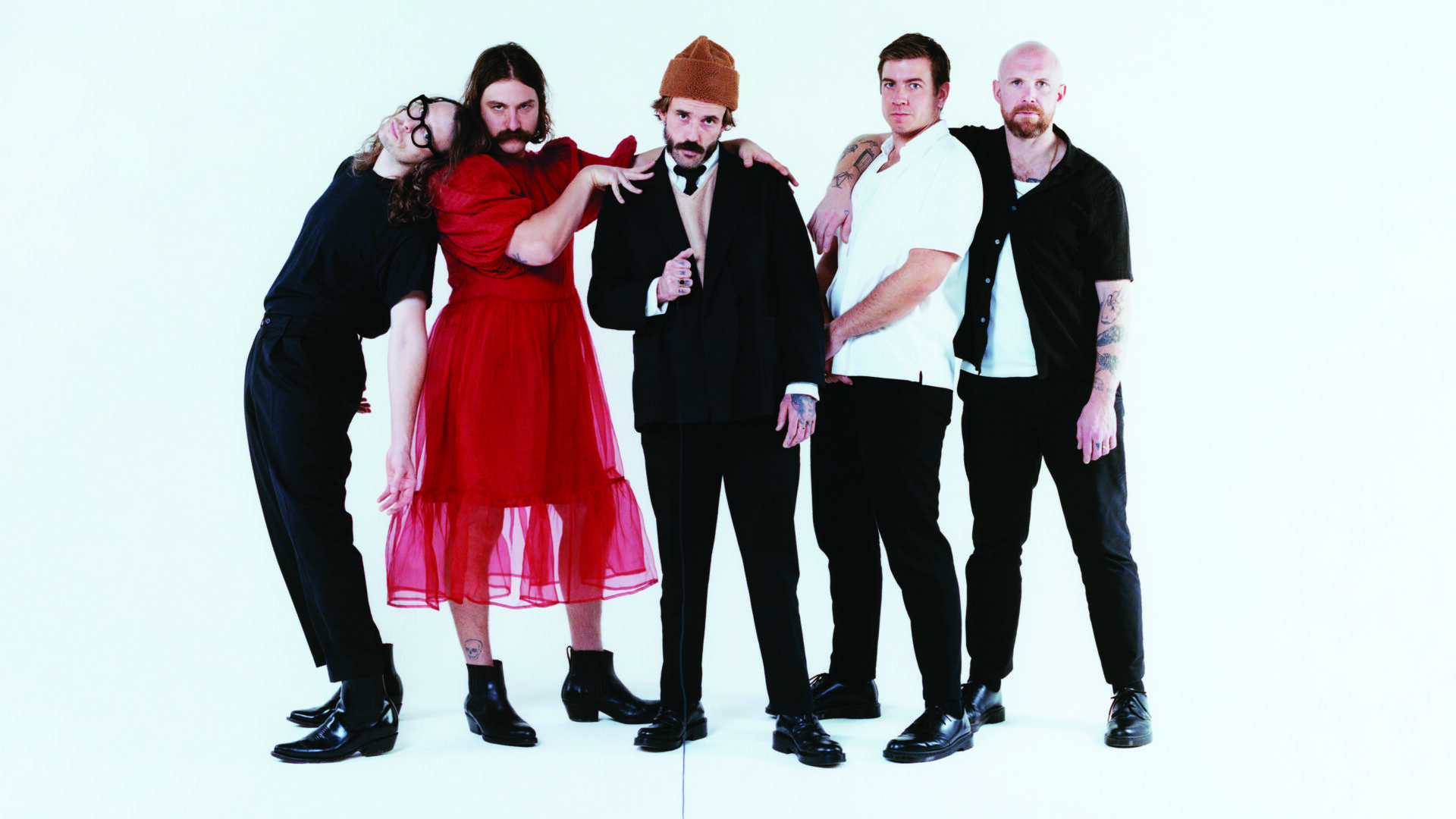
Joe Talbot leans across the table as he cradles a cup of coffee in his Bristol home. “I have two things in my life: my child and this album,” he says. The album in question is TANGK, IDLES’ fifth and most musically adventurous record yet. After he speaks to me vivaciously about its themes of love and his continued recovery from addiction, he heads off to pick his child up from school. “This is the best job in the world,” he smiles of the dual passions that currently rule the 39-year-old’s life.
Forming in Bristol in 2009, IDLES started out making soft indie-pop songs in the vein of The Maccabees. The next near-decade saw line-up changes and hundreds of small gigs which led to them toughening up their sound and releasing lauded debut album Brutalism in 2017. Its raucous, crunchy sound and Talbot’s unashamedly vulnerable and political lyrics (“The best way to scare a Tory is to read and get rich,” he boomed on ‘Mother’) struck a chord with both young listeners and disenfranchised old punks. After toiling away for eight years, they became the most important guitar band in the country almost overnight.
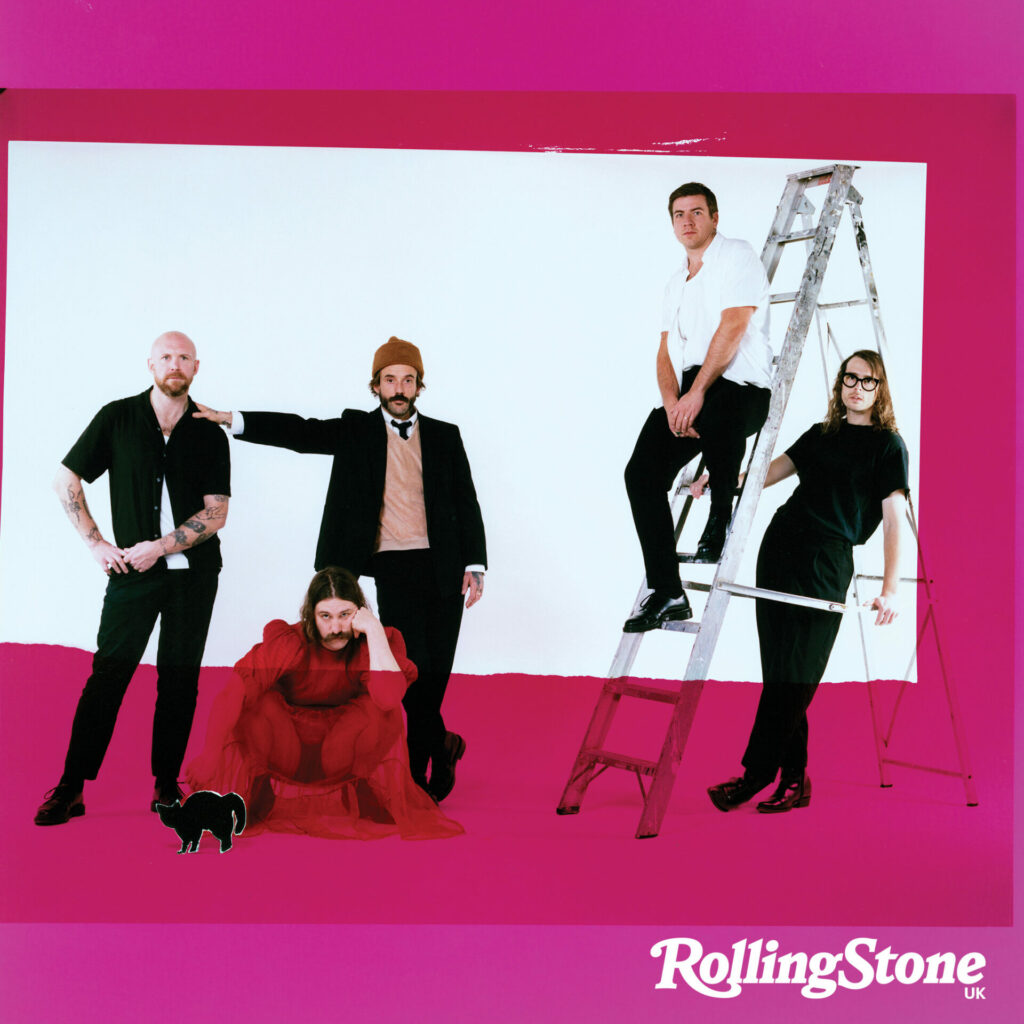

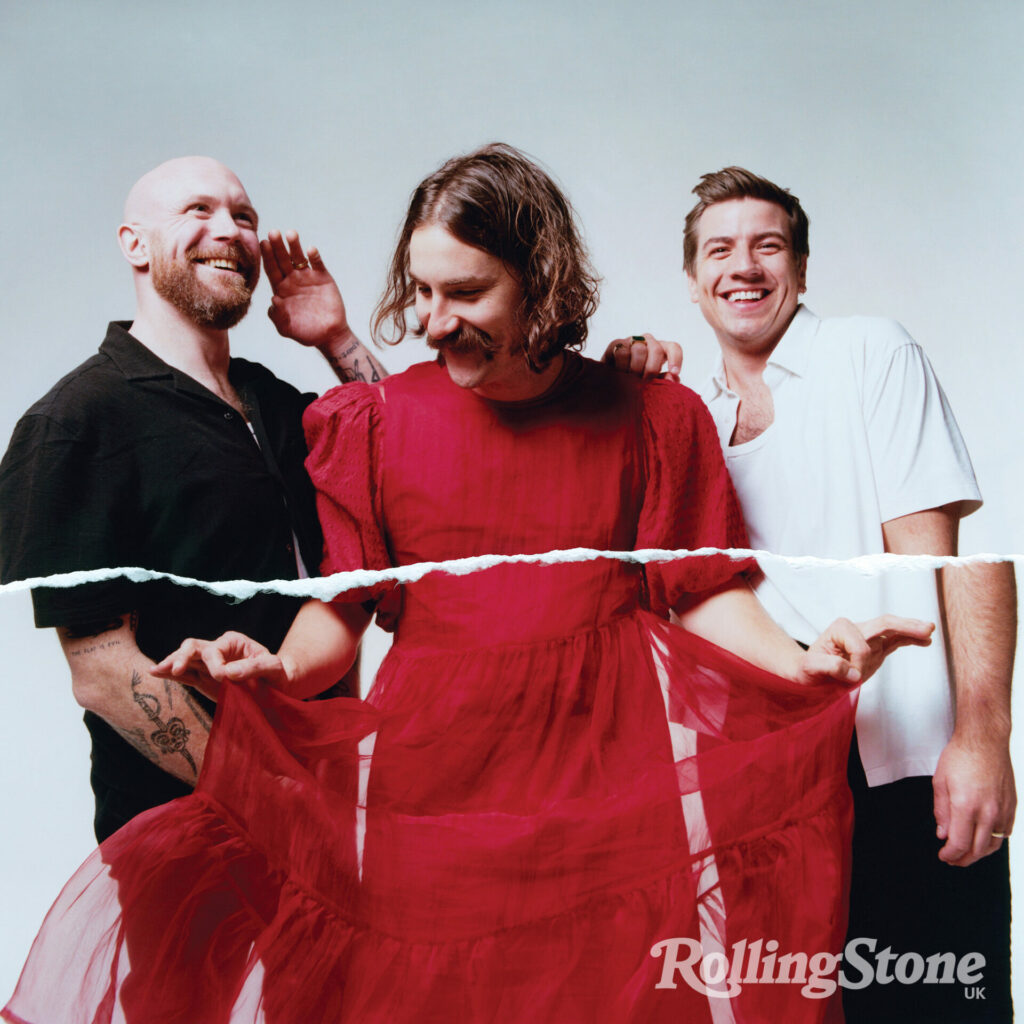
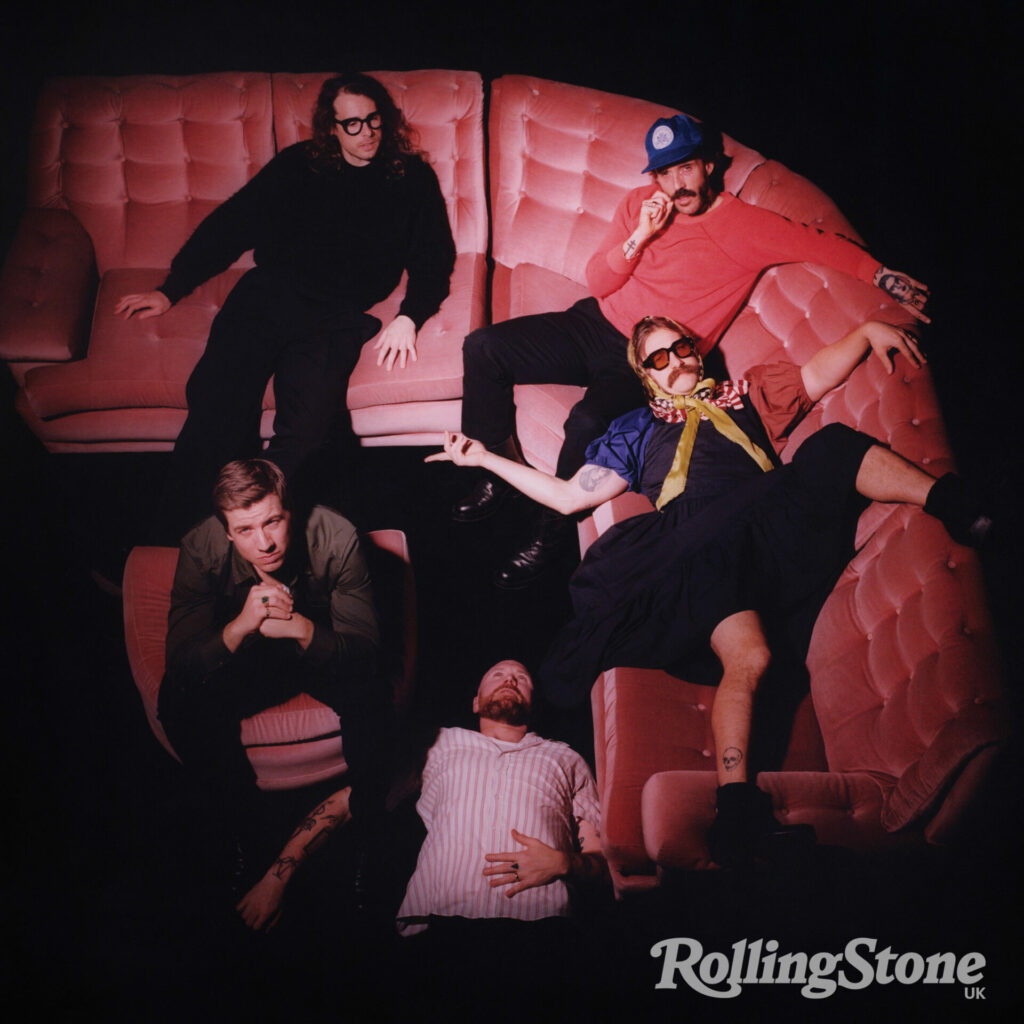
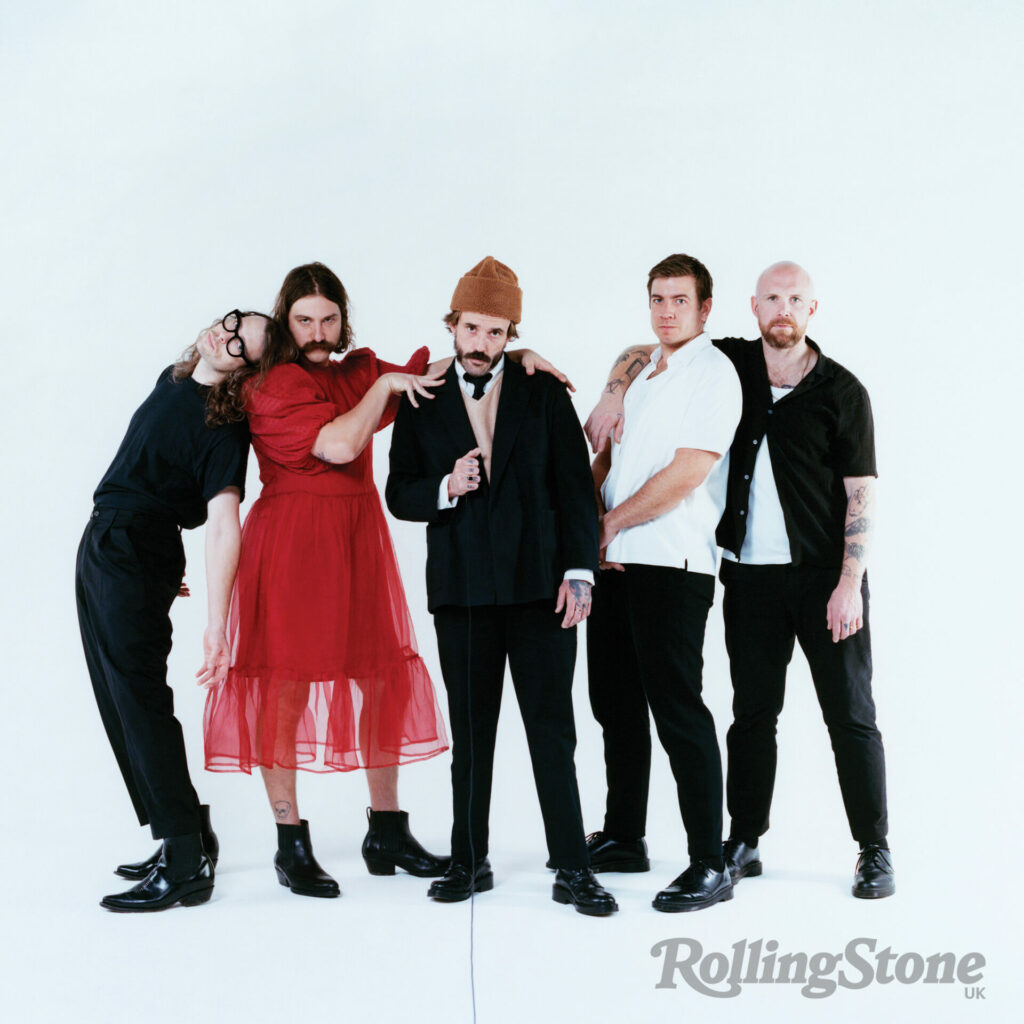
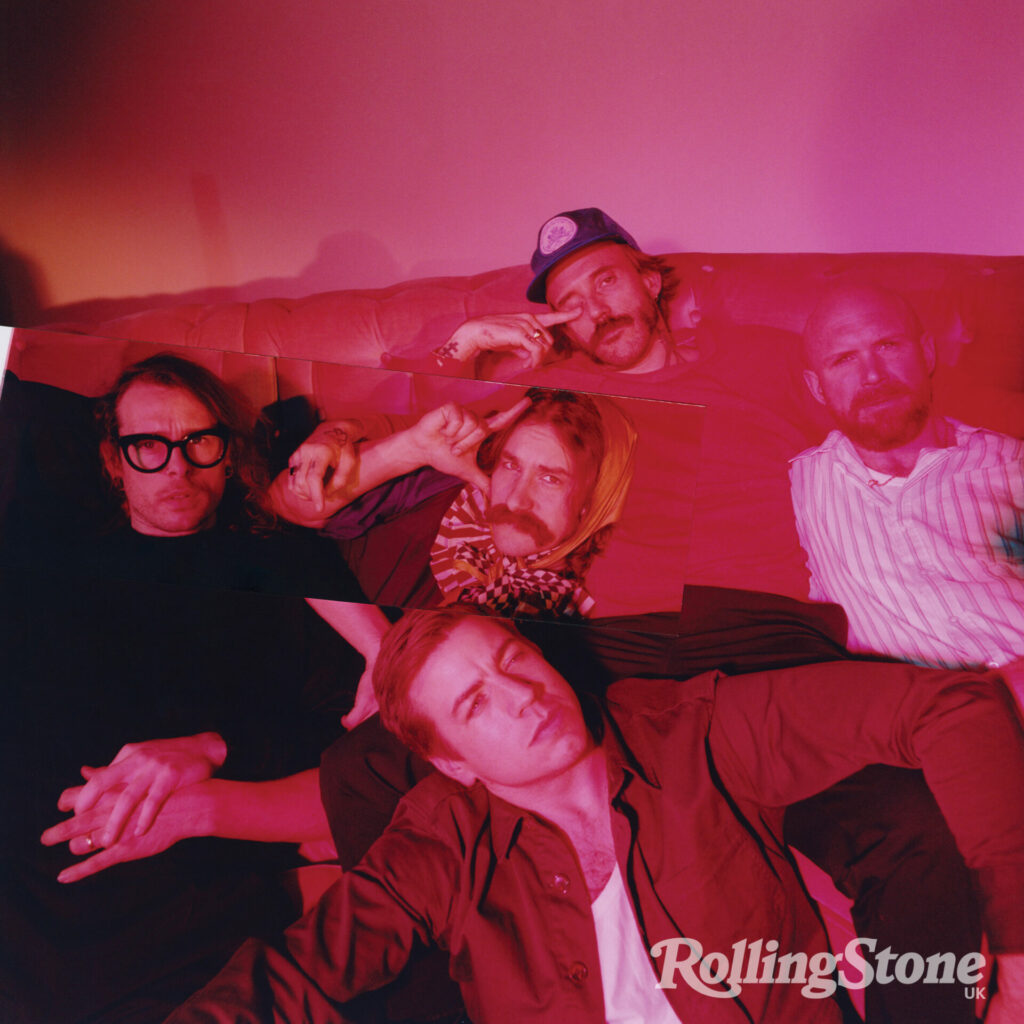
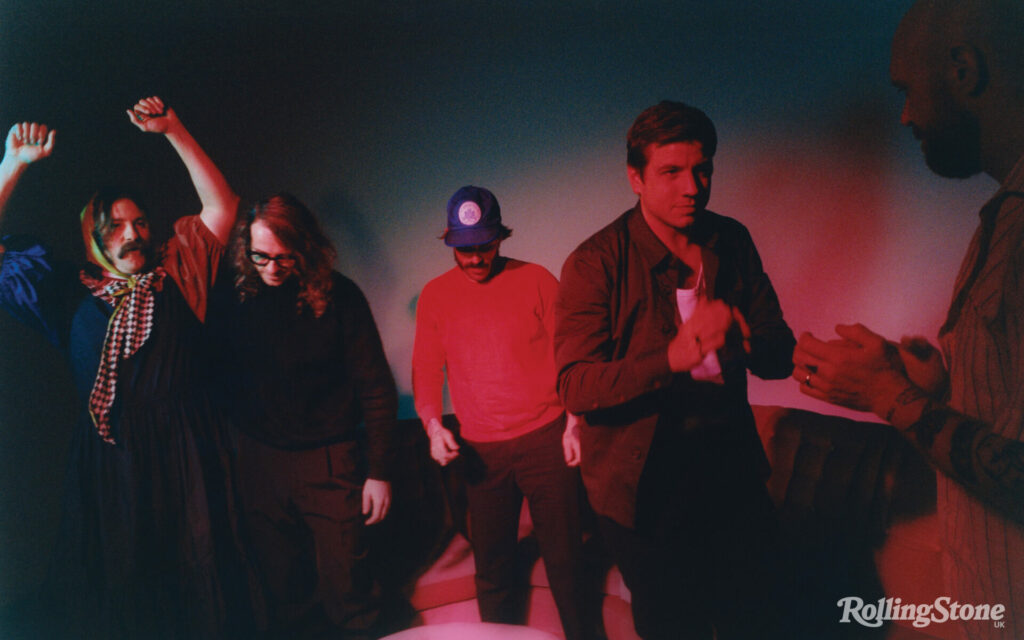
Second album Joy as an Act of Resistance followed in 2018, and soon they were headlining Alexandra Palace and being held up as the latest in a long line of saviours of British guitar music – whether it needed saving or not. They doubled down on the formula on 2020 album Ultra Mono, before taking a reflective step back on the following year’s CRAWLER, an album more concerned with lyrical and sonic experimentation than the battering ram of drums and guitars that they’d made their name with. Throughout it all, Talbot has been unwaveringly open in his interviews and lyrics about his struggles with addiction and how the band and its community of fans have supported him and lifted him up during his journey.
“I started to realise around Ultra Mono that I was a public figure for the first time, or at least understood it,” Talbot reflects of an album that he still admires but can now see the holes in. “Then you start playing to the choir. That was what the album was about – using bravado and this almost crazed sense of what ‘big’ is to make an album. Whereas now I’m like, ‘No, I won’t. I will not surrender to insecurity.’ I am insecure. I am scared. I do want to be loved. But you get way more when you just be yourself.”
Pushing through this insecurity to find genuine connection is a key component of TANGK, which continues a lot of what CRAWLER started. It’s an album exclusively of love songs, presented in more subtle and soft ways than the IDLES of old. “I didn’t want to present a standard view of what a love song is,” Talbot says. Compared to the roaring frontman we see on stage with IDLES, he is softly spoken and mild-mannered in person, presenting his thoughts gently and with care. “I needed love, and I needed to find love. I was very lonely and scared again, and when going through addiction, self-love is very important. You need to stop this cycle. You have a child; you have a career – this goes one of two ways. One is unbelievable and fruitful and beautiful; the other one is hell. What are you gonna do? Even if that seems like a simple choice, addiction makes it crazily hard. On top of that, love is abundant everywhere, but you need reminding of that. It’s seeing the wood through the trees. I just needed to take a breath, start working on myself, loving myself, and the rest would come. And it did.”
In order to find this love, Talbot had to disconnect. “I realised that, no matter what, people are gonna think things of me that I don’t like, but I don’t fucking listen to them in my day-to-day life, so why would I search [for it] online? I haven’t looked online once today,” he says, pushing his phone away from him on the kitchen table for dramatic effect.
I would like that to be my life as well, I suggest to the singer, with both concrete reasons (work commitments) and more flimsy ones (fear of missing out, force of habit) keeping me tethered to my phone.
“Most people would do, that’s the weird thing,” he responds. “I’m not doing it to be different… My dad never had a TV, ever. I was always like, ‘Why hasn’t he got a TV?’ but I realise now that he could see what it does to people. Why would you want to stare at something for five hours every night?”

As a father, does he envisage a younger generation rejecting the instant gratification of social media and shunning the things that currently rule our lives?
“The internet is so much more overpopulated now that waves of fashion feel so much more huge. You just have to look at NFTs. How fucking insane was that for like, five minutes? ‘This is the future, people! Invest in it!’ Do you understand what these people are saying? Imaginary real estate? People are putting their life savings into these things and, lo and behold, it crashed.
“There are dangerous parts to AI in terms of cultural currency and nanotechnology, but my kid and their generation are going to laugh like we laughed at the Victorians,” he adds. “You don’t need a robot in your kitchen to crack an egg, you just crack an egg. I think it’s going to calm down, and everyone is going to realise the real effects of what social media is doing to people and rein it in. It’s not healthy. Being on some fucking weird social network nine hours a day is not healthy.
“The human race is the most evolved because we have that perspective – we can look around corners and remember it. So, we will progress, and our kids won’t be as stupid with it, but for now it’s a fucking massive, bizarre, dangerous circus.”
Though it’s Talbot’s personal prerogative to log off and avoid online discourse, that hasn’t stopped it coming for his band. In the past, they have been embroiled in back-and-forth beefs with Fat White Family and Sleaford Mods and been accused of working-class cosplay. When I meet the singer in late November, Israel’s siege on Gaza and the Palestinian people is continuing, and IDLES have been criticised online and by other bands on stage for their perceived lack of statement and support for Palestine. Despite adding their signature to Jeremy Corbyn’s Music for A Ceasefire open letter, many believed that a band who have made their name – and a great deal of their fanbase – through strong political views and left-wing ideals should be amplifying important information at such a critical time.
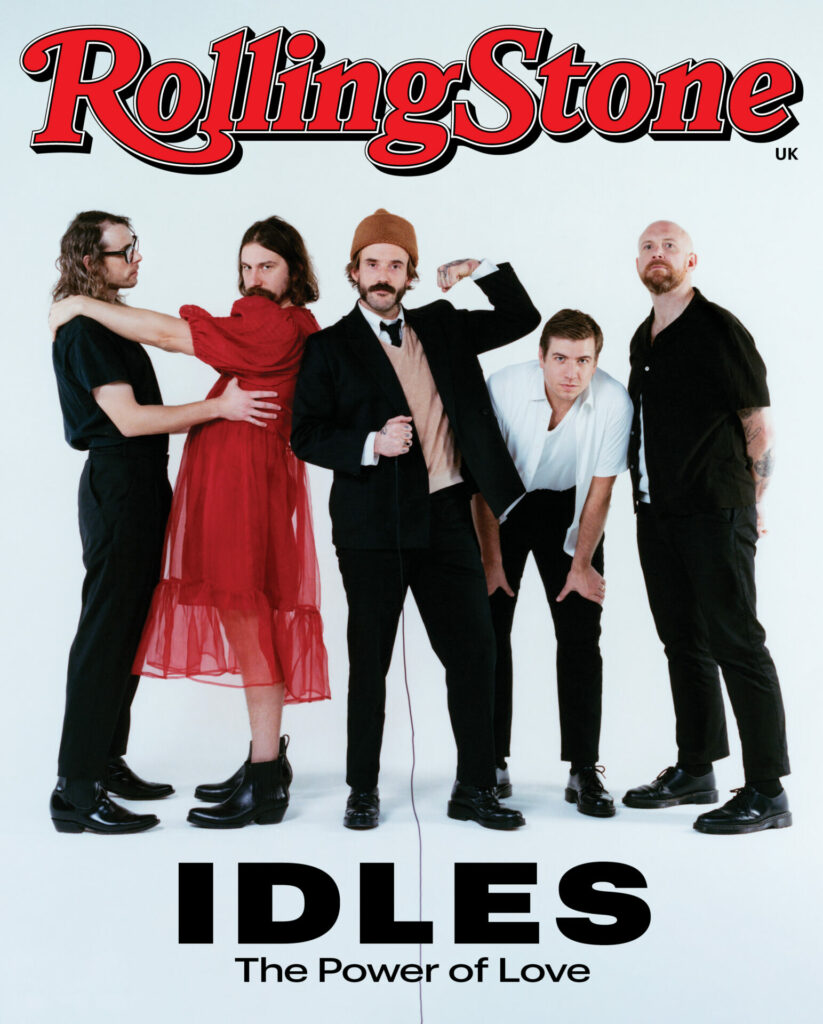
For Talbot, it’s quite simple. “I stand by the same stuff I’ve always stood for,” he says. “You look at any interview, and it’s the same thing. We are not activists. I am concerned with the human condition and how that affects each other, and I use music to connect it to the world, not the internet. Nothing is contradictory to what I said 12 years ago on stage and in every interview. Yes, my values lean towards socialism. What I believe and what I have believed since I was 15 years old is that we have sanctions and handshakes from our government and the American government with Israel and other forces that are fucking hideous.
“I adamantly disagree with Rishi Sunak as a private investor profiteering off other people’s death, shaking hands with Netanyahu. I think he should be ashamed of himself. Do I think that telling my friends on Instagram is going to help? No, I don’t.
“I’m a public figure,” he adds. “I could quit and go back to care work. I’ve signed petitions, gone on marches, donated money. I get the conversation, but people being offended that I’m not posting on Instagram is insane. As our audiences will tell you, I’ve been going through a lot recently, and the worst place for my mental health is online. I’m recovering, and I’m happy to recover on my own.”
It was a similar situation during the Black Lives Matter protests of the summer of 2020, when IDLES were criticised for a lack of instant reaction. “There was a lot of virtue-signalling, and we wanted to make sure that anything we contributed was going to be [helpful],” Mark Bowen told NME at the time. In the background and away from online discourse, Talbot was designing a special IDLES shirt which ended up raising £36,000 for the charity.
Talbot is an engaging and open conversationalist, considering his answers deeply before presenting them slowly and carefully. During our conversation, he addresses these kinds of criticisms of the band calmly and warmly, admitting that he has been somewhat misunderstood in the past due to his methods of communication. The only moment in our whole time together that he bristles or seems uncomfortable is when he discusses IDLES’ public categorisation as a punk band, something he brings up unprompted.

“Being called a punk band was something I wanted to stop, because I didn’t want to then have to ride that horse and be forced to play what people thought was punk music,” he says with determination. “As a musician, I was listening to hip-hop from the age of 11 to 25. Do I strip that from my past so as to adhere to some lazy person’s perspective? I’m more than that as a musician. I’m a punk musician, I’m a rapper, I’m a folk artist, I’m a painter. I’m whatever I want to be today. I’m a creative person, and no one’s going to tell me who I am. I’m in a band with five very different human beings in it, and we’re not going to be just one thing.”
He adds: “I found it quite problematic that people said [to me]: ‘You’re a white man who hates your government and what they’ve done to the working classes: you must be a punk.’ No, I’m not. I’m just not a Tory, and I’ve got a microphone, and I sing about what is on my mind. Now I’m not shouting on my albums anymore, I’m never going to suddenly be like, ‘Oh, Tony Blair was all right, actually!’ I’m very saddened by where our country has got to, but I want to sing about love.”
If a band’s categorisation as ‘punk’ is as simple as a vocalist roaring their way through songs as opposed to crooning, TANGK will surely finish what CRAWLER started and paint IDLES in a very different light. Barely ever on the new album does Talbot raise his voice to the booming growl that defined the band’s first albums; instead, he takes inspiration from the soul singers he adores, manifesting his softer outlook on life through his vocal delivery. On TANGK, these love songs can be personal and giddy (“I’m a smart man, but I’m dumb for youuuu,” he croons on ‘Roy’) or rallying cries (“Lift my people up, that’s my tool!” goes highlight ‘POP POP POP’), and both are equally vital to the album’s narrative.

The singer agrees when I suggest that this transformation from visceral shouting to the alternative form of expression he has discovered in singing is as simple and apt an allegory for the change from the old to the new Talbot as it seems on the surface. “I’ve been doing a lot of therapy recently, and I’ve realised that I’ve been wearing a defensive mask,” he reflects. “I lost a lot of things in my life, and I was very scared. You have to fight through these things, and sometimes that means putting on a couple of shin guards or war paint.
“I was very much in a state of flux with my emotions and addiction, and I wasn’t getting out of it. So, I changed the script, and I made a new approach built from poise and love and using art to connect again. That’s very much why I started the band – to connect to the universe and to connect to people. It was almost like finding my mojo again…” he adds before sighing: “That’ll be the quote now!
“I found my voice again – both figuratively and literally,” he affirms, unable to resist expanding on the simple – but accurate – narrative of TANGK. “That’s the truth. I found my voice again. I can be vulnerable. I can be in love. I can be soft.”
As with everything in our conversation, it all comes back to his album and his child. “There was definitely a new perspective from being a parent,” he says. “You have to be a softer touch, physically. My form of parenting is about empathy and just putting myself in my child’s shoes for a minute, and thinking: ‘What would you do if you were relying on someone else for food all the time?’ You wouldn’t get pissed off with them.

“I’m treating things with empathy and realising that I want to open doors artistically with my audience that haven’t been opened before, and I can’t do that by using the same approach. It has to be something new to let my other sides through. I’m so complex, as everyone is, and I want to explore all of it. Lyrically, content-wise and thematically, all our albums are very different and complex, but that [shouting] voice made things quite two-dimensional at times, so people misunderstood my message. Instead of just expecting everyone else to understand me, I had to change my approach.”
To make TANGK, IDLES guitarist and producer Mark Bowen worked once again with rap producer Kenny Beats while also drafting in Radiohead’s sixth member Nigel Godrich. The band first met Godrich when they were invited to play his relaunch of the legendary From the Basement series. “That was a very nerve-wracking time for us because I’d watched it religiously,” Talbot says. “The way he made us sound, it felt like he really understood us musically, and we were quite surprised by that.”
After sessions at Godrich’s studio in Brixton, the band, Godrich and Beats decamped to the south of France to mould the new album. “What I wanted from this album from the outset was for us to get more advantageous and experimental,” Bowen tells me from his home in Belfast when I call him the day after meeting Talbot in Bristol. “Nigel told us about tape loops and showed us a lot about different approaches to writing. IDLES has always been a sonic cacophony, but we wanted to explore that violence in ways that isn’t just using feedback and noise. What a good producer does is make the band feel confident in pursuing those things and feel confident in making mistakes. Nigel is just great at that.”
While the trio of producers buried their heads in their equipment, Talbot had only written one full song of lyrics for the album – the soft and beautiful ‘Grace’ – and left the rest to spill out of him off the cuff when he entered the booth. TANGK is an album about instinctive and undeniable love – something that can’t be quantified or forensically examined – so he wanted his words to feel the same. When the lyrics came out, “they were perfect,” he says with a smile. “They were exactly what I wanted them to be, which is poetic and true. It was just a very vibrant time – everything felt lucid, vivid.”
While IDLES emerged as a five-piece band with what seemed to be a traditional sound and approach, CRAWLER and TANGK have shone a light on the special and unusual creative partnership between Talbot and Bowen, two artists who are opposites in many ways. “CRAWLER sparked a lot of inspiration for more work between me and Bo, and what we’re capable of,” says Talbot. “We realised that we’re way, way more interested in our relationship as writers than we first thought. Bowen is very pragmatic and the opposite to me,” he explains. “He gives me good advice when we’re in a good place emotionally, but if we’re in a bad place, we just clash and have to leave each other alone. I want him one way quite aggressively, and he wants me another way, or he doesn’t want me at all. It’s a very push-and-pull affair, so we have to go away, regroup and come back.”
Bowen laughs but agrees when presented with his sidekick’s feelings. “That is definitely where we really rub and clash; we’re the exact opposite person in almost every way,” he says. “The ethos of the band and how we present that is something that we are very much aligned on, but as far as our creativity [goes], it’s so different. I work best with chaos, but he needs order.”
Viewed in terms of this creative partnership and musical experimentation, everything on TANGK comes back to its core tenet: love. “I just realised that writing about anything else would have been pretentious at the time,” says Talbot. “I didn’t have anything else I wanted to write about. I just wanted to focus on this. I was fixated on love, and I am fixated on love. All the other stuff is bullshit to me right now. I want to be connected to the people that I need to be connected to, and to heal. So why write about something else?”

As well as a personal manifesto, it’s one that reaffirms IDLES’ status as a band for the people. Though it may not be transmitted via online statements and loud, brash rock songs with political sloganeering for lyrics, here they present an even more potent form of connection, one Talbot believes can be necessary and useful for his audience as well as himself.
“Because of the way my life has happened and the choices I made, I need to heal,” he reflects before we part ways for him to head out on the school run. “I need to stay grounded in order to make the right decisions and be safe and be a good father. That’s coming out in my music, just as the thing that’s at the forefront of my mind always comes out in my music.”
As we wrap our conversation, Talbot’s hope for the next era of IDLES is that fans will understand and openly receive this new form of expression and the message of TANGK. “I hope that this is a new way of helping people heal and make the right decisions politically, by giving people love and talking about love. The more people have love and empathy in their hearts, the more they make the right decision. I’m singing from the same hymn sheet – it’s just a different song.”
Fashion direction: Joseph Kocharian
Photography: Lillie Eiger
Digital Operator: Thomas Sedgwick
Set Design: Isabel Alsina Reynolds
Hair & Makeup: Sophia Cox
First Photography Assistant: Dom Fleming
Second Assistant: Alejandro Martinez-Campos
